Resources
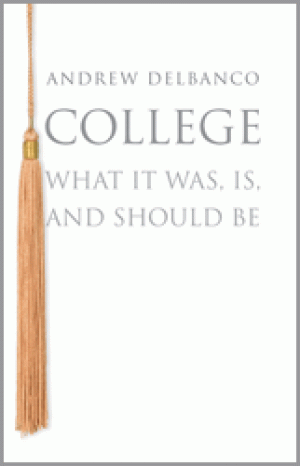
As the commercialization of American higher education accelerates, more and more students are coming to college with the narrow aim of obtaining a preprofessional credential. The traditional four-year college experience--an exploratory time for students to discover their passions and test ideas and values with the help of teachers and peers--is in danger of becoming a thing of the past. In College, prominent cultural critic Andrew Delbanco offers a trenchant defense of such an education, and warns that it is becoming a privilege reserved for the relatively rich. In arguing for what a true college education should be, he demonstrates why making it available to as many young people as possible remains central to America's democratic promise. In a brisk and vivid historical narrative, Delbanco explains how the idea of college arose in the colonial period from the Puritan idea of the gathered church, how it struggled to survive in the nineteenth century in the shadow of the new research universities, and how, in the twentieth century, it slowly opened its doors to women, minorities, and students from low-income families. He describes the unique strengths of America's colleges in our era of globalization and, while recognizing the growing centrality of science, technology, and vocational subjects in the curriculum, he mounts a vigorous defense of a broadly humanistic education for all. Acknowledging the serious financial, intellectual, and ethical challenges that all colleges face today, Delbanco considers what is at stake in the urgent effort to protect these venerable institutions for future generations. (From the Publisher)
Effective pedagogy in the capstone course or integrative seminar — a 1000 word response to a Call for Papers.
This article employs George Lakoff and Mark Johnson's work on metaphor (1980) to examine the current use of the term “learning outcomes” within higher education. It argues that “learning outcomes” is an ontological metaphor (education becomes focused on results that one can understand and measure) that resonates with contemporary academic capitalism. Yet because metaphors highlight some things and conceal others, thinking about teaching and disciplines using “learning outcomes” hides other dimensions of academic capitalism and obscures unquantifiable and highly complex aspects of education. Finally, the article explores ways in which an emphasis upon outcomes has consequences for the field of Religious Studies.
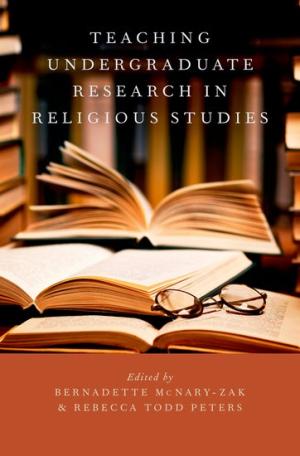
AAR Teaching Religious Studies Series (Oxford University Press) Teaching Undergraduate Research in Religious Studies offers an introduction to the philosophy and practice of Undergraduate Research in Religious Studies and takes up several significant ongoing questions related to it. This volume emerges from sustained conversations about the pedagogy of Undergraduate Research by a group of teacher-scholars in the discipline, and it seeks to extend those conversations. For those new to Undergraduate Research, this book provides an overview of fundamental issues and pedagogical questions and practical models for application in the classroom. For seasoned mentors, it acts as a dialogue partner on emerging issues and offers insight into pertinent questions in the field based on the experience of recognized experts. Individual chapters focus on select theoretical and practical topics including the nature of collaboration between faculty and students, what it means for undergraduate students to make an "original contribution" in their research, how to identify and shape a research project that is appropriate and manageable, the types of institutional and professional support systems needed to adequately support and reward faculty who participate in this kind of pedagogy, and procedures for adequate and appropriate assessment. Student perspectives highlight the importance of Undergraduate Research to student learning. (From the Publisher)
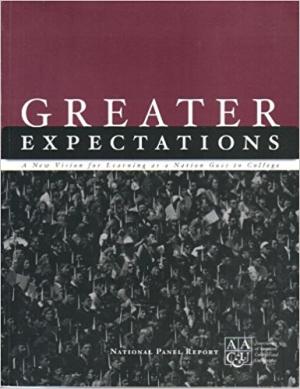
This report of the Greater Expectations National Panel calls for a new focus on excellence to better prepare students for the 21st century world. The report recommends the creation of a New Academy characterized by high expectations, a focus on learning, commitment to demonstrated achievement, intentional practices, and an engaged, practical liberal education for all students. (From the publisher)
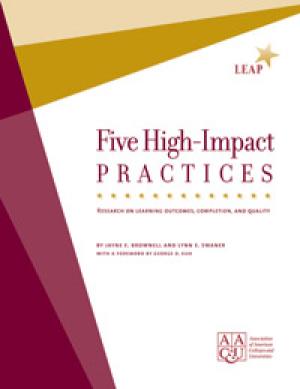
This monograph examines what educational research reveals about five educational practices: first-year seminars, learning communities, service learning, undergraduate research, and capstone experiences. The authors explore questions such as: What is the impact on students who participate in these practices? Is the impact the same for both traditional students and those who come from historically underserved student populations? The monograph includes a foreword by George D. Kuh, High-Impact Practices: Retrospective and Prospective, and recommendations for how to improve the quality of high-impact practices. (From the Publisher)
One of the most remarkable things about the human consciousness is that each of us has the capacity to observe our thoughts and feelings as they arise in our consciousness. Why shouldn?t cultivating this ability to observe one?s own mind in action,becoming more self aware or simply more "conscious" be one of the central purposes of education? Even a cursory look at our educational system makes it clear that the relative amount of attention that higher education devotes to the exterior and interior aspects of our lives has gotten way out of balance. Thus, while we are justifiably proud of our "outer" development in fields such as science, medicine, technology, and commerce, we have increasingly come to neglect our "inner" development the sphere of values and beliefs, emotional maturity, moral development, spirituality, and self understanding. This growing awareness of the importance of spirituality in higher education was recently underscored by the Templeton Foundation through its award of a $1.9 million grant to UCLA?s Higher Education Research Institute to support a large scale longitudinal study of spiritual development in college undergraduates. A pilot study of 3,700 students enrolled at forty-six colleges and universities was initiated in spring 2003, and a full-scale assessment of 90,000 students enrolling at 150 institutions will be initiated in fall 2004. Perhaps the most important thing to keep in mind about spirituality is that is touches directly on our sense of community. More than anything else, giving spirituality a central place in our institutions will serve to strengthen our sense of connectedness with each other, our students, and our institutions. This enrichment of our sense of community will not only go a long way toward overcoming the sense of fragmentation and alienation that so many of us now feel, but will also help our students to lead more meaningful lives as engaged citizens, loving partners and parents, and caring neighbors.
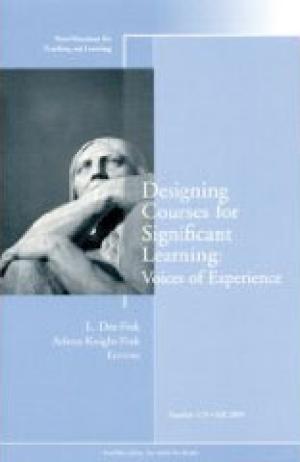
Higher education today is being called on to deliver a new and more powerful kind of education, one that prepares students to be more engaged citizens, better equipped to solve complex problems at work and better prepared to lead meaningful lives individually. To respond to this call, teachers in colleges and universities need to learn how to design more powerful kinds of learning into their courses. In 2003, Dee Fink published a seminal book, Creating Significant Learning Experiences, that offered teachers two major tools for meeting this need: the Taxonomy of Significant Learning and the model of Integrated Course Design. Since that time, educators around the world have found Finks ideas both visionary and inspiring. This issue of New Directions for Teaching and Learning contains multiple stories of how college-level teachers have used these ideas in a variety of teaching situations, with subject matter ranging from the sciences to the humanities. Their conclusion? The ideas in Finks book truly make a difference. When used properly, they lead to major improvements in the level of student engagement and the quality of student learning! This is the 119th volume of the Jossey-Bass higher education quarterly report series New Directions for Teaching and Learning, which offers a comprehensive range of ideas and techniques for improving college teaching based on the experience of seasoned instructors and the latest findings of educational and psychological researchers. (From the Publisher)